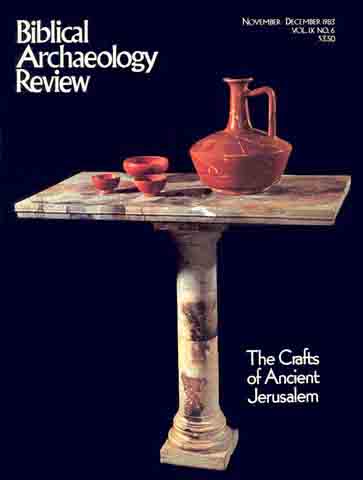Biblical Archaeology Review, November/December 1983

Features
The first-century Capernaum synagogue in which Jesus preached has probably been found. Because more than one synagogue may have existed in Capernaum at this time, we cannot be sure that this new find was Jesus’ synagogue. But this recently discovered first-century building is certainly a likely candidate.a At the moment, the synagogue is not a […]
An understanding of geography is essential to an understanding of many sections of the Bible. For this reason, an up-to-date atlas—maybe more than one—is a tool no serious student of the Bible can be without.
The map illustrations with this atlas review are reproduced exactly the same size as they appear on the atlas pages. In most instances we have chosen comparable map sections so that readers may easily compare type and line quality, topographical rendering, and historical, Biblical and geographical information. The Historical Geography of the Holy Land
If Jerusalem is famous for one thing, it is for being a religious center. But our interest in the Holy Cities lies also in its everyday life, of which so little is known. Recent investigations revealed that in ancient times, especially in the late Second Temple period (50 B.C.–70 A.D.), various arts and crafts, such […]
We came upon it suddenly, in the very first year of our excavations. At that time we had not yet excavated a single house that had witnessed the catastrophe of 70 A.D., when the Romans destroyed Jerusalem. We were still emotionally unprepared for the impressions and associations raised by the prospect before us. In subsequent […]
According to Genesis 11:28–31, Abraham was born in the city of Ur. Contrary to earlier reports, the name Ur does not appear in the mid-third millennium cuneiform tablets uncovered at the ancient city of Ebla, now in Syria. That is the latest word from Ebla’s Italian team of archaeologists and epigraphers, who toured the United […]
Professor R. Thomas Schaub of Indiana University of Pennsylvania has resigned as a judge in BAR’s Biblical Archaeology Essay Contest. Schaub’s resignation arrived in August, less than a month before the entry deadline. The contest will be judged by the remaining two judges, Professor Menahem Mansoor of the University of Wisconsin and Professor Kenneth G. […]
